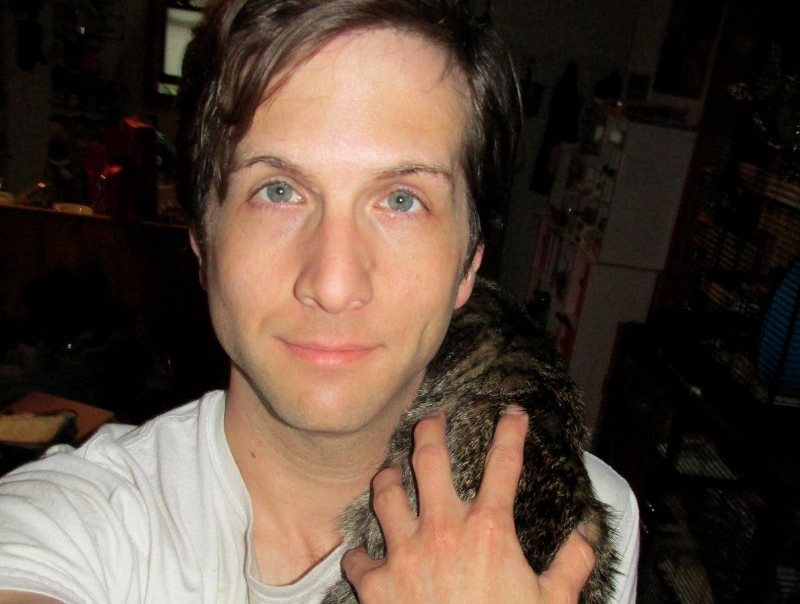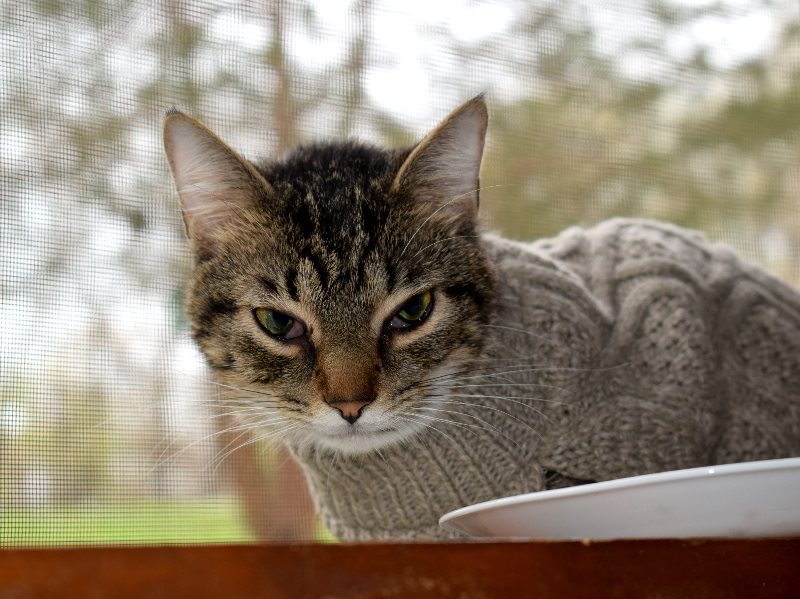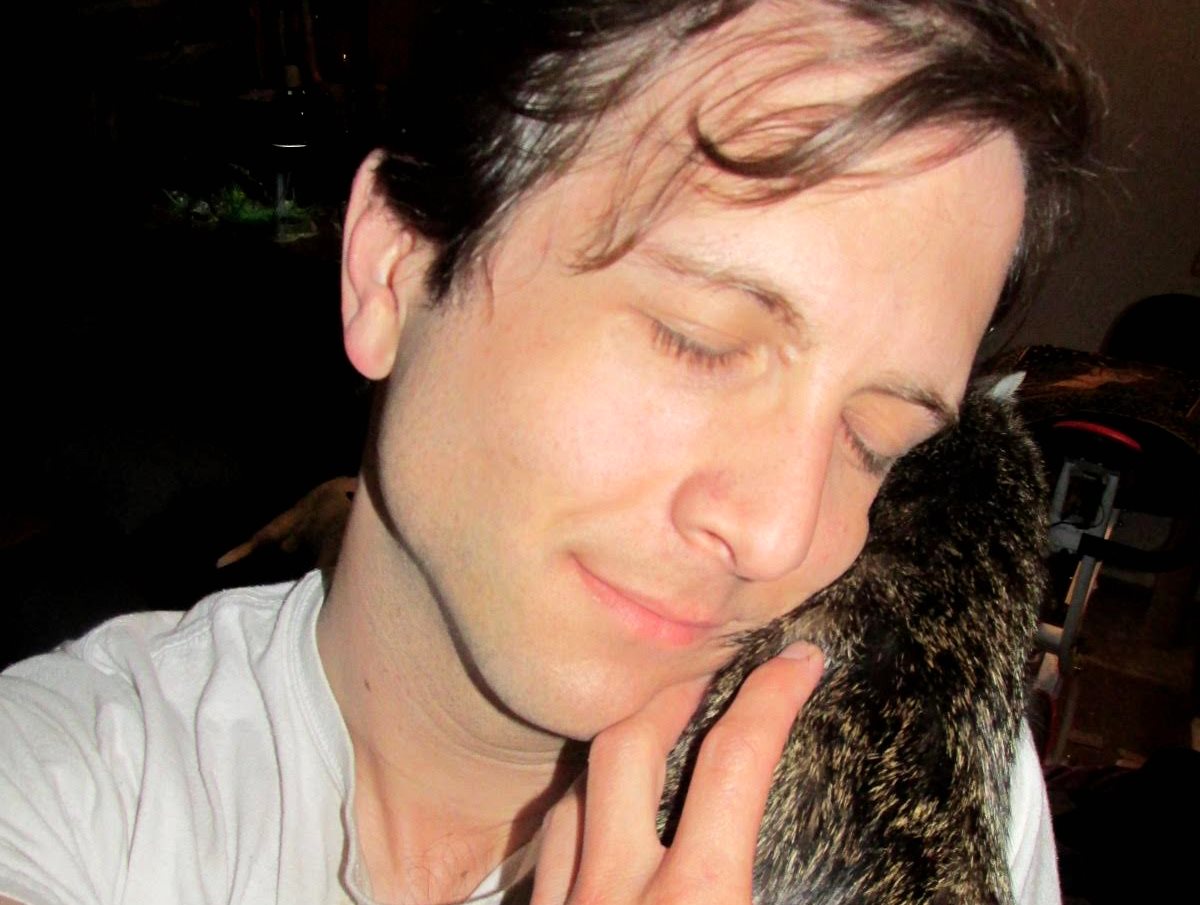
05.02.19
-Jareth, the Goblin King, Labyrinth
How you turn my world, you precious thing.
This Terrifying Known

The day of Jareth's oncology appointment, we go to see Avengers: Endgame. We had this plan already, before we received his diagnosis. I had asked for the day off, which now seems uncomfortably prescient. If I hadn't, I would not have been able to go to his appointment. I would not have known immediately what would happen to him.
I tell Amber that I keep having one of Tim Minchin's bits going through my head, where his wife tells him not to get up and check if their baby is breathing because either it will wake the baby, or the baby will be dead, and they should enjoy these last few moments before their lives are destroyed.
Amber's mother had the idea of seeing this movie. She is already in our apartment when I come upstairs. She had seen the kitten, who had decided to leave the kitchen cupboard, where he spent much of the day pretending to be a plate (until I removed them all), and was now perched atop his cat tree. He refuses to get down, but she sees his face. Amber thinks that, aside from his lymph nodes covering his eyes, he is doing okay. I don't think that is reassuring, and I don't agree with her assessment. I pet him and tell him to hang on a few more hours, that we will be taking him to the doctor soon.
Large transactions to either of our accounts come to my email, so I see how much the pet care has cost Amber recently. She assures me, after reconciling the charges, it could have been almost $500 more if she weren't employed by the animal hospital. At this point, she is an indentured servant to the cat, working for weeks to pay off the debts she is accruing for him.
I asked her last night the question that I feared asking for days: If I woke up or came home and the kitten was dead, what am I to do? He is not like the rodents, where I would put them in the refrigerator in a Ziploc bag until she came home and possibly necropsied them. She tells me to bring him to the animal hospital if she is working, and otherwise put his body somewhere safe until she could see him and tend to his remains. He will be cremated, put in an urn, given a shelf on our wall alongside Pico. I know this last part for certain. I want to get a laser-etched plaque of us all together, but no such picture exists yet. If he goes into remission, if he looks more like himself, I will make sure I get one.
Last night, while he let me hold him, I took dozens of selfies, mostly of his back and me looking as though I had been crying.
Whenever I am not thinking of my kitten, I feel almost guilty. I have had a hard time feeling anything like pleasure since finding out about his diagnosis. I feel okay in the lobby, before the movie starts, sipping my soda before ten in the morning. Here is life that has nothing to do with the tragedy that has fixed my life in place.
My mother suggests that Jareth's situation is dismal, but other animals will need my love. I do not want other animals. I want Jareth.
There is a countdown until the moment a doctor might tell me that there is nothing that can be done for my cat.
I am distracted for a moment, by the spectacle of the film, and then my mind comes back to it. This was not the best movie to be dealing with this crisis, thematically.
I can't see the answer we will get, when I usually find it easy to picture potential futures. It is this haze of possibility. I don't know what will happen, only that the hours are getting short until I do know.
It is better to know what treatment he will get, how far along he is, what can be done. Otherwise, I look at him as this terrifying unknown.
After the movie, we three go to a fast food restaurant for a late lunch before we drive to his appointment. We have not yet ordered when Amber gets a call from the oncologist's office, asking if we wanted a slot an hour sooner. I feel empty and say we should go, damn lunch. Amber says that we need to eat before so long a drive, even though I am without hunger owing to my anxiety and a few handfuls of movie theater popcorn.
When we get back to our apartment to get the cat, Amber's mother asks if we want her to drive us there. Amber hesitates, saying she doesn't have to. I leap in and thank her, because I would prefer not to make the drive so keyed up.
In the waiting room, as Amber fills out paperwork for Jareth, she points out that this hospital uses a blue light to signal that someone is having their pet put down. Amber's hospital uses fake candles, which she likes better.
The oncologist sits us down and says we need to have a talk. Given her demeanor, I assume she is telling us that nothing can be done. Amber points out later that the doctor believed we were negligent owners for letting it go this far, until I showed her a picture I had taken Sunday where he looked many times healthier, much more like a cat. We got here the second there was an appointment for us, after having spent hundreds of dollars getting to this point. Amber is incapable of neglecting an animal.

After this, the doctor is more open. We aren't monsters, we are distraught, and our pet's cancer is hyperactive.
The doctor explains one treatment after another, courses of action and what she would recommend for Jareth. No radiation, but different levels of chemotherapy. It starts with an enzyme, Elspar, that should starve the cancer for a little while and steroids to make him feel better. She assures me he will again look as he did. All this is for maybe six months of life for him, though the doctor makes explicit that six months in almost beyond possibility.
The price tag for this treatment, in total, could rub close to ten thousand dollars.
Beside the hospital, outside the window, is a car lot. I mention that we could buy one of these for what it will take to give the kitten six months. But what is money, really? We can't spend money to save him, because he is terminal and may be sick beyond medical intervention. We can only spend money to prove to ourselves that we did everything we could, that we are the sort of people who would spend their savings failing to rescue a cat from his own immune cells.
Amber agrees that this charge would be reasonable. The doctor's expression flickers in shock that Amber agreed for us. To what degree is her estimate inflated to convince clients that their pet is not worth as much as their solvency?
When the doctor leaves the room, I tell Amber that she cannot have any sick pets for a long time after this. We cannot afford it financially or emotionally.
When the vet returns, she looks at me and asks if I have any questions. I deflect back to Amber, who keeps using the correct word for medications and anatomical terms for the location of engorged lymph nodes. "She's the expert," I say. "I'm just here."
All my fuses blow. Everything is fuzzy. My cat may live a little longer. We don't know how long. There is a chance that this initial treatment will not take. There is even a chance he could go into anaphylactic shock from it and die, which is why he is also prescribed Benadryl. We could kill him trying to save him.
The doctor says we did the right thing not giving him steroids before, because it would have told the cancer our plans. I do not want to imagine his cancer as an intelligent force. It cannot be reasoned with. It is radically multiplying cells, not an invading force with a general. We will poison our cat to harm the cells, until the cancer is too strong to fight any longer.
Amber is far calmer than I am. She knows what all this means better than I can. She has seen animals in all states of doom. She has found dogs' veins as the euthanizing fluid -- called Blue Juice -- was administered. She knows the death of animal patients. Maybe this is why she can take a step back, while I cannot.
The doctor mentions juvenile lymphadenosis as the diagnosis that might mean our cat isn't on the border of death, but adds it is not at all likely given his other symptoms. That was the only false hope she had for us, but she snatches it away in the same breath. It is strange she even went to the effort of mentioning it.

I haven't been hungry for days. I've eaten, especially if I cooked, but I haven't cared about it. After hearing the treatment plan for chemotherapy, I feel hungry again, but also nauseated.
I didn't expect that the doctor would propose a cure. Aside from the exorbitant sticker price, there was nothing too surprising. Amber is heartened that the cat's liver function is better than she expected given his anemia. The doctor's jargon soothes her.
I only feel relief when the doctor says that she can still see that the kitten has fight in his eyes. Turns of phrase are my language far more than "submaxillary tumor" and "prednisolone."
"Can you get this?" Amber asks when the appointment is done.
I take out my debit card and see a thousand dollars vanish for "Oh, he isn't dead quite yet."
I begin to weep as we get back into the car, and then I cannot. It is one sob and then I am dissociated. I can't describe most of the drive home. I retreat into looking up trivia about Endgame, as it gives me something to say other than what is going on in my head.
We stop to pick up sandwiches I had called in. There is a confusion where there are two meatball subs instead of a chicken parm. I say that I would rather pay for the extra sub than get someone in trouble. I feel almost human here, surprisingly so. Here are people who do not know about my dying cat and so do not care.
I am to the anger stage of grief. I was depression and bargaining to this point, but anger has found its way in. We must spend so much of our money and drive so much of the week, and we will still lose the cat soon. We aren't doing any of this for a cure. It feels insulting, pushing us to the brink and still killing our baby cat.
You wouldn't play this game in a casino.
"Give me a thousand dollars!"
"Okay, will our cat live?"
"NO! Give me a thousand more dollars!"
"Okay, will our cat live now?"
"Absolutely not! But he will remain alive for the moment, maybe! He could be dead tomorrow morning, no matter what we did today! You don't know! Give me a thousand dollars!"
Amber will bring him back in a week and the doctor will decide what she is able to do. Maybe we will go for the full chemotherapy regime. Maybe she will suggest we flick on that blue light sooner rather than later, though I don't think this is how they work. We are willing to pay, so they are keen to let us.
It has been less than a week since we knew Jareth had lymphoma. Everything feels miserable. I can't fathom doing anything I enjoy. Amber is losing weight. I am snippy and depressed.
I ask Amber why she isn't acting destroyed. She says it is because she hasn't been sleeping well, though this is the opposite of what that should mean. I want her to tell me that, through her medical knowledge, we have reason for hope. Though I did not understand exactly what the medical terms are -- once the doctor discovered that Amber is a vet tech, they stopped speaking English -- I understood "probably not six months."
Jareth is still so unhappy. Nothing they put in him made him feel better or helped him act more like himself. If I saw this cat outside my home, I would assume he was dead, or very nearly. I would not believe this animal would be coming back to the Land of the Living, even briefly. If I didn't know this cat, I would not come with ten feet of him for fear he was contagious. Instead, I kiss the top of his head, above his tumorous eye, and tell him I am sorry this is the hand life dealt him.
If he isn't markedly better in a week, I'm not sure what will happen. I won't be there. I know that Amber won't give up on him, no matter what.
The joy has drained out of my life that we are facing this. I tell Amber I don't want this to affect our relationship, and she says it won't. But I am already sullen and resentful. I already felt that she spends too much time on our pets or replaces them when they didn't need replacing. She spends over an hour each night tending to each of their needs, more so now. She is disappearing beneath the petsí care.
I can't express my emotions to Amber, because then I become a burden. I can't talk things out with her because she doesn't want to hear them. In the shower, I tell her that I want to yell. She says I should yell in a positive way, which is not what yelling is.
Amber says this thousand-dollar visit might have made the cat's tongue a little pinker. For what they did to him, I want him to have bright eyes and a ravenous appetite. A pinker tongue is nonsense. If you can't heal him, don't lie to us and charge us the down payment on a car.
There is a danger to anthropomorphizing animals, assuming their thoughts and needs match your own. Still, in Jareth's position, I can imagine my terror and frustration as my body betrays me, especially when I am so young and was jumping about my apartment kingdom a week before. Now, I am dying a wasting death, and the people who have cared for me all this time weep, force me to eat food and pills by shoving a tube down my throat, disturb me when I am trying to rest (and I am always trying to rest now), and everything in my life grows narrower. My vision, my strength, my motivation, my throat. A week ago, I was only a bit run down. Two weeks ago, I was a beloved and spritely kitten. Then I was not, so quickly. So, it seems, without reprieve.
There will be no cure, only waiting.
Soon in Xenology: Social Justice Wiccans. Jareth.
last watched: American Gods
reading: Aliens: The World's Leading Scientists on the Search for Extraterrestrial Life
listening: Damien Rice